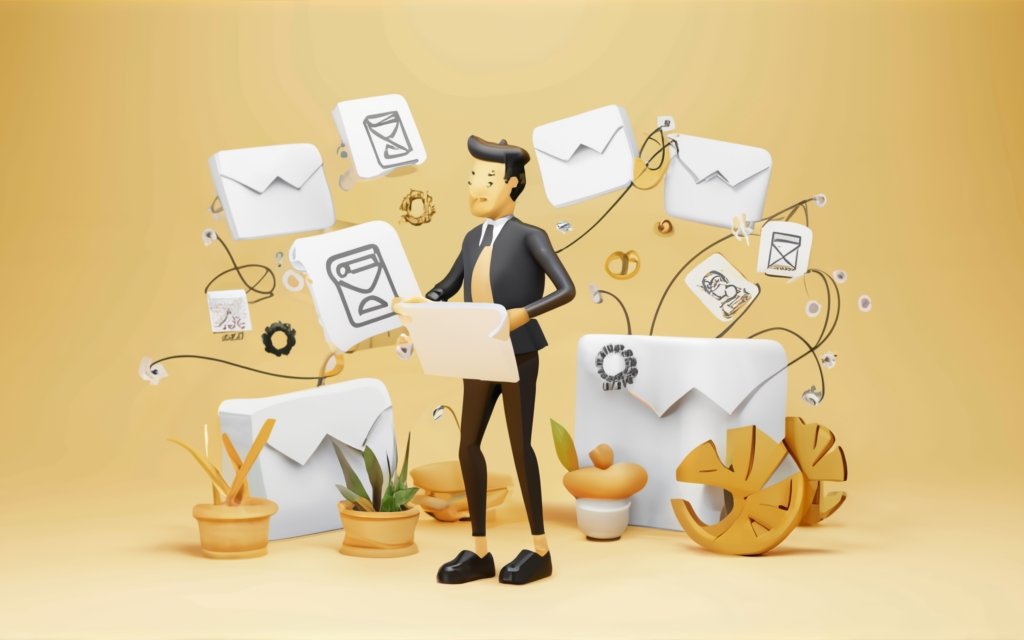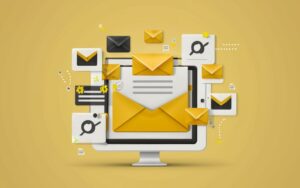After a job interview, it’s crucial to send a follow-up email to reiterate your interest in the position and thank the interviewer for their time. But when is the right time to send this email, and what should it include? What to put in a follow up interview email subject line? Here are some guidelines and use cases to help you craft the perfect follow-up email.
When to Send Follow Up Interview Email?
When navigating the post-interview phase, timing and content of your follow-up email are key. Here are some scenarios and tips for sending effective follow-up emails:
1. Thank You Email Subject Line Immediately After the Interview
- Send Within 24-48 Hours: Always send “thanks” to them for their time, reiterate your interest in the job, and briefly mention a highlight from the interview conversation. Use a clear and concise follow-up email subject line, like “Thank You for the Opportunity – [Your Name].”
2. Use follow-up Email Subject Line Template When You Haven’t Heard Back
- Follow-Up After a Week: If you haven’t heard back within the timeframe mentioned during the interview, it’s best to send a follow-up email. A good subject line could be “Following Up on [Job Title] Position – [Your Name].” This shows you’re still interested in the job and eager to hear about the next steps in the interview process.
3. Write a Follow-up Email After a Phone Interview
- Same Day Follow-Up: For phone interviews, sending a follow-up email on the same day is a good practice. This email can be a simple thank-you note, expressing gratitude for the opportunity and mentioning one or two points discussed during the phone interview.
4. If the Recruiter Ghosts You, send an Follow-up Email After An Interview
- Send a Polite Reminder After Two Weeks: If you haven’t received any response after your initial follow-up, it’s appropriate to send another email. Keep the tone professional and express your continued interest in the position. A subject line like “Checking in on [Job Title] Role – [Your Name]” can be effective.
5. Follow up Email After an Interview to Request a Post-Second Interview
- Reaffirm Your Interest: After a second interview, send a follow-up email to thank them again and to reiterate your interest in the role. Mention any discussions or points that came up in the second interview that further solidified your desire to work with them.
6. When You Want to Withdraw Your Application
- Professional Courtesy Email: If you decide to withdraw your application, it’s courteous to send an email informing them of your decision. Thank them for their time and the opportunity, and briefly explain your reason for withdrawal in a respectful manner.
In all cases, keep your follow-up email templates personalized, concise, and focused on the position and your conversation with the interviewer. Remember, a well-crafted follow-up email can significantly boost your chances of landing the job.
What to Put in Follow Up Interview Email Subject Line
1. Express Gratitude and Interest
Begin with a thank-you note in the subject line to express gratitude for the interview opportunity. This approach not only demonstrates good manners but also reaffirms your interest in the job. In the body of your email, reflect on specific points discussed during the interview and mention how they reinforced your desire to be part of the team. A subject line that combines gratitude with a clear indication of the job title can set a positive tone for your follow-up email.
2. Clarify the Email’s Purpose
Use the subject line to directly state the purpose of your follow-up. This could be to inquire about the next steps in the interview process or to provide additional information that supports your application. Ensure the subject line is concise yet informative, making it easy for the hiring manager to understand the context of your email. In the body of the email, briefly restate your qualifications and express how you can contribute to the role, reinforcing the message of your subject line.
3. Show Eagerness for Next Steps
Craft a subject line that conveys your keen interest in moving forward in the interview process. This demonstrates your enthusiasm for the role and keeps the conversation focused on the next stages. In your email, mention your eagerness to learn about the next steps and how you look forward to contributing to the company. A well-thought-out subject line, coupled with a body that reiterates your readiness to proceed, can keep your application active in the interviewer’s mind.
4. Personalize with Specific Details
Personalizing your subject line with details such as the interview date or a topic discussed can make your email stand out. This approach shows that you were attentive during the interview and are invested in the opportunity. In the email body, expand on these details, perhaps by elaborating on a discussion point from the interview or how your experience aligns with the company’s needs. Personalization in both the subject line and email body can create a more memorable and impactful follow-up.
5. Inquire Professionally About Status
If you haven’t received feedback within the expected timeframe, use your subject line to politely inquire about your application status. Keep the tone professional and courteous, showing your continued interest without appearing impatient. In the email, you might mention that you are following up as per the discussed timeline and are keen to hear any updates. This approach shows your proactive nature and respect for the hiring process.
6. Reference Previous Communication
Utilize the subject line to make a direct reference to your previous interactions, such as a recent interview or email exchange. This can help the recipient quickly place your follow-up in context. In the body of your email, you can refer back to specific points made during your last communication and add any new information that might strengthen your candidacy. This strategy helps in maintaining a continuous and relevant dialogue with the hiring manager.
7. Offer Additional Insights Post-Interview
Use your follow-up email to provide additional insights or thoughts that you may not have shared during the interview. A subject line that hints at offering further value can intrigue the recipient to read more. In the email, articulate these insights clearly, showing how they align with the company’s goals or the specific challenges of the job. This approach demonstrates your deep thinking and ongoing engagement with the role.
8. Request Feedback if Necessary
If you suspect you didn’t get the job or haven’t heard back in a while, craft a subject line that politely requests feedback. This shows your willingness to learn and grow from the experience. In the email body, express your appreciation for the opportunity to interview and your desire to improve your professional skills. This kind of follow-up can provide valuable insights for your future job applications.
9. Reaffirm Your Commitment to the Role
Especially useful for a second follow-up email, your subject line should reaffirm your strong interest in the position. In the email, restate why you believe you are a great fit for the role and how your skills and experience align with the company’s needs. This persistence can sometimes turn the tide in your favor, especially if the hiring process is taking longer than expected.
10. Highlight Your Unique Selling Points
Use the subject line to subtly highlight what makes you a unique candidate for the position. In the body of your email, expand on these unique selling points, providing concrete examples of how your skills and experiences make you an ideal fit for the role. This approach helps to differentiate you from other candidates and keeps your application memorable.
11. Demonstrate Your Understanding of the Role
Craft a subject line that reflects your understanding of the role and the company. In the email, discuss how your background and skills align with the job requirements and the company’s culture. This shows that you have done your homework and are genuinely interested in the position, not just any job.
In each of these strategies, the key is to balance professionalism with personalization, ensuring your follow-up email is respectful, relevant, and reflective of your genuine interest in the role.
Follow Up Email Subject Line Examples and Interview Follow-up Email Templates
Here are 30 ideas for follow-up interview email subject lines, each with a brief explanation:
- “Thank You for the Opportunity – [Your Name]”: Expresses gratitude and personalizes the email with your name.
- “Following Up on [Job Title] Interview”: Clearly states the purpose of the email and the position you interviewed for.
- “Interested in Next Steps for [Job Title]”: Shows your eagerness to proceed in the hiring process.
- “Reflecting on Our Conversation About [Job Title]”: Indicates a desire to continue discussions from the interview.
- “Inquiry About [Job Title] Position Post-Interview”: A professional way to ask for an update after the interview.
- “Re: [Job Title] Interview on [Date]”: Directly references a previous interview, making it easily recognizable.
- “Additional Insights Regarding [Job Title] Role”: Offers more information or thoughts post-interview.
- “Update Request: [Job Title] Position”: Politely asks for a status update on your application.
- “Continued Interest in [Job Title] – [Your Name]”: Reaffirms your enthusiasm for the role.
- “Appreciating the Interview for [Job Title]”: Shows gratitude and reminds them of your interview.
- “Seeking Feedback on [Job Title] Interview”: A respectful way to ask for feedback if you suspect you didn’t get the job.
- “Quick Thank You for [Job Title] Interview!”: A brief and friendly thank-you note.
- “Eager to Discuss Next Steps in [Job Title] Role”: Demonstrates your proactive approach to the job.
- “Post-Interview Thoughts on [Job Title]”: Shares additional reflections or ideas after the interview.
- “Checking In: [Job Title] Position After Interview”: A gentle nudge for an update.
- “Further to Our [Job Title] Interview”: Continues the conversation from the interview.
- “Enthusiastic About [Job Title] Opportunity”: Conveys your excitement about the job.
- “Awaiting Your Update on [Job Title] Role”: Politely indicates you’re waiting for a response.
- “Revisiting Our [Job Title] Interview Discussion”: Brings up specific points discussed in the interview.
- “Hope to Hear Back: [Job Title] Interview Follow-Up”: A hopeful and polite reminder.
- “Continuing Our [Job Title] Conversation”: Suggests ongoing engagement and interest.
- “Thank You and Next Steps for [Job Title]?”: Combines gratitude with a query about the process.
- “Looking Forward to Feedback on [Job Title]”: Shows you value their opinion and feedback.
- “Still Interested in [Job Title] – Any Updates?”: Directly asks for an update while reaffirming interest.
- “Thank You for Considering Me for [Job Title]”: Expresses appreciation and reminds them of your candidacy.
- “Any News on the [Job Title] Position?”: A straightforward request for an update.
- “Reflecting on [Job Title] Role Post-Interview”: Indicates thoughtful consideration after the interview.
- “Eagerly Awaiting Your Response on [Job Title]”: Shows anticipation and interest in the role.
- “Re: Our Recent Discussion on [Job Title]”: Refers back to the interview conversation.
- “Thank You for the Insightful [Job Title] Interview”: Appreciates the interview experience and the insights gained.
Each of these subject lines is crafted to be clear, concise, and focused on the specific context of your follow-up. They aim to capture the recipient’s attention and convey your continued interest in the position.
Key Takeaways on Follow-up Email Subject Line Examples for Follow-up Email After an Interview
Here are six key takeaways regarding crafting subject lines for follow-up emails after an interview:
- Timeliness is Crucial: Sending your follow-up email within 24-48 hours after the interview demonstrates promptness and professionalism. A subject line that acknowledges the recent interview, such as “Reflecting on Our Interview Last Week,” can be effective.
- Gratitude Goes a Long Way: Always start with a thank-you note. A subject line like “Thank You for the Interview Opportunity” shows appreciation and sets a positive tone. Remember, a thank-you email is not just a courtesy; it’s an essential part of post-interview etiquette.
- Clarity and Conciseness are Key: Keep the subject line short and to the point. A clear and concise subject line, such as “Following Up on [Job Title] Position,” helps ensure that your email is noticed and understood quickly.
- Personalization Makes a Difference: Including the interviewer’s name or a specific detail from the interview can make your email stand out. For example, “Thank You, [Interviewer’s Name], for Discussing [Job Title]” adds a personal touch and shows attention to detail.
- Express Continued Interest: Use your subject line to show that you are still interested in the position. A line like “Eager to Discuss Next Steps for [Job Title]” can convey your enthusiasm and eagerness to move forward in the hiring process.
- Be Prepared for Follow-Up: If you don’t get a response to your first email, it’s acceptable to send a second follow-up email. A subject line like “Checking In: [Job Title] Position Two Weeks Post-Interview” is appropriate for this scenario. It’s respectful yet assertive, indicating that you are still interested in the position and awaiting a response.
Each of these points highlights the importance of a well-crafted subject line in your follow-up email. The right subject line can help ensure your email gets the attention it deserves and can be a deciding factor in your chances of moving forward in the interview process.
Conclusion on Following Up After an Interview
In the competitive world of job hunting, mastering the art of the follow-up email after an interview is as crucial as the interview itself. A well-crafted follow-up email, starting with a great subject line, can significantly boost your chances of landing the job. It’s always best to start with a thank you note, expressing gratitude for the interviewer’s time. This not only shows good manners but also reinforces your interest in the position.
When you write a thank you email, keep it short and sweet. A lengthy message might overwhelm the recipient, whereas a concise and focused email respects their time and gets your point across effectively. Including the interviewer’s name in the subject line adds a personal touch, making your email stand out in their inbox. Remember, a good follow-up is not just about following templates and examples; it’s about personalizing your message to reflect your unique interaction with the interviewer.
The first follow-up email should ideally be sent within 24 hours of the interview to show that you are prompt and genuinely interested. If you don’t receive a response, don’t hesitate to write a second follow-up email. This demonstrates persistence and can be a gentle reminder to the hiring manager about your application. However, it’s important to wait for a reasonable period, typically two weeks, before sending this second email.
A strong subject line is your first impression in the follow-up process. It should be compelling enough to make the recipient want to read your email. Learning how to write an effective subject line is an invaluable skill. It’s a blend of being professional, yet personable; direct, yet respectful. The subject line of your follow-up email is a great opportunity to express your continued interest in the role and to thank the interviewer for considering you.
In conclusion, a follow-up email after an interview is a critical step in the job application process. It’s an opportunity to remind the hiring manager of your qualifications, to express your enthusiasm for the role, and to show that you’re proactive and courteous. A personalized follow-up, with a carefully chosen subject line and a well-written email message, can be the deciding factor in your job search. So, take the time to craft these emails thoughtfully, as they can be just as important as the interview itself in shaping your career path.
FAQ on Follow up Interview Email Subject Line
- How soon should I send a follow-up email after the first interview?
- It’s best to send a follow-up email within 24-48 hours after your interview. This quick response shows your enthusiasm for the job (look forward to hearing!) and appreciation for the interviewer’s time.
- What should I include in a post-interview follow-up email?
- Your follow-up email should express gratitude for the interview, reiterate your interest in the position, and briefly mention a key discussion point from the interview. Make sure to thank the interviewer and include any relevant information that supports your candidacy.
- Are there any tips for writing an effective follow-up email?
- Yes, there are several tips: keep your email concise and to the point, personalize the message, express your enthusiasm for the role, and be sure to proofread before sending. A well-written follow-up email can enhance your chances of getting the job.
- How can sending a follow-up email after an interview help my job application?
- A follow-up email shows your continued interest in the position and keeps your application at the forefront of the hiring manager’s mind. It also demonstrates your professionalism and can provide an opportunity to reinforce why you are the best fit for the role.
- Is it appropriate to send another follow-up email if I haven’t heard back after two weeks?
- Yes, if it’s been two weeks since your interview and you haven’t received a response, it’s appropriate to send another follow-up message. This email should politely inquire about the status of your application and restate your interest in the position.
- What should I do if I sent a follow-up email but still haven’t received a response?
- If you’ve already sent a follow-up email and haven’t heard back, it’s important to be patient. While waiting to send follow up interview email subject line, continue with your job search. If significant time passes, it may be an indication to move on to other opportunities. Remember, persistence is key, but so is respecting the hiring process.




